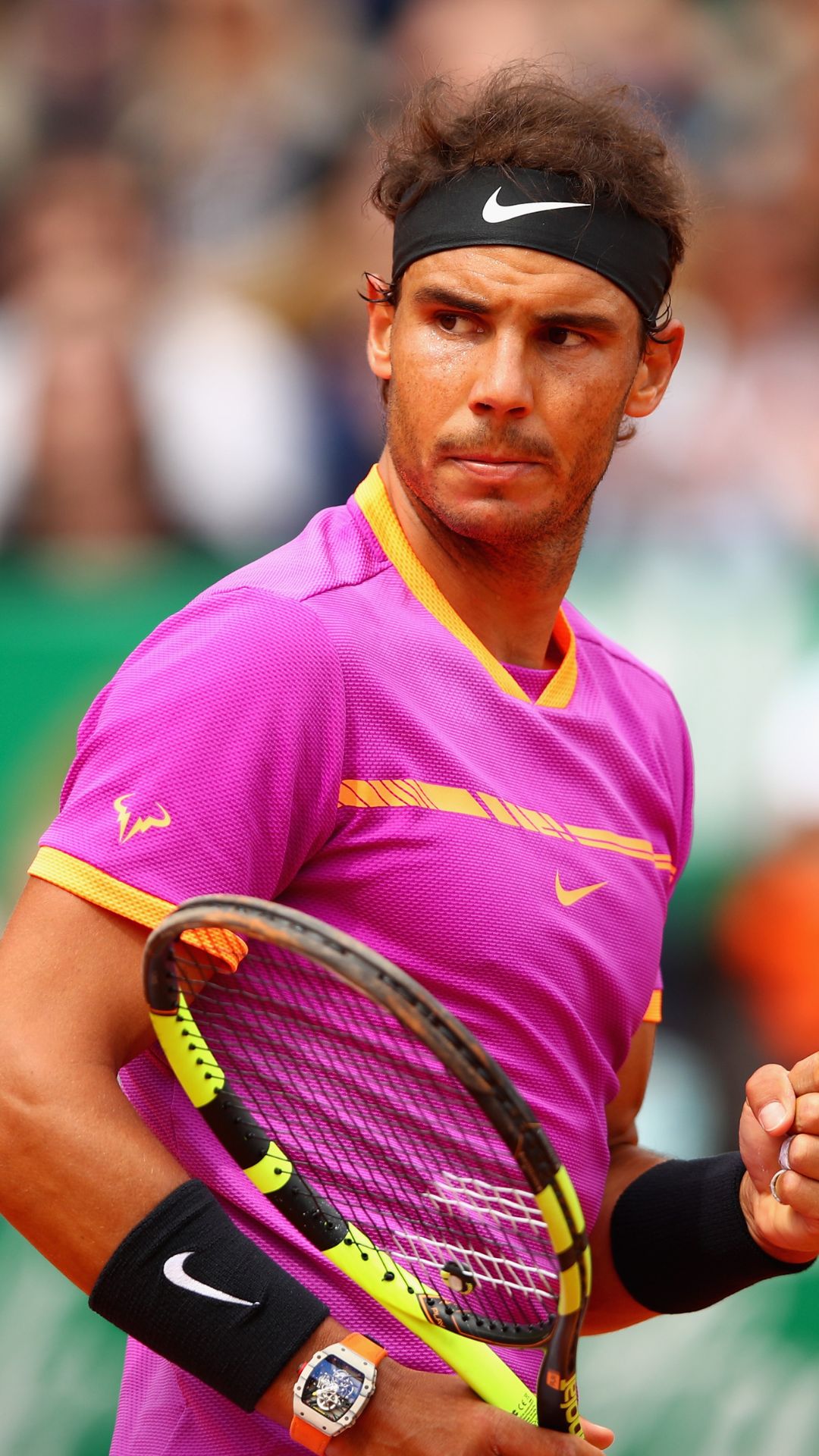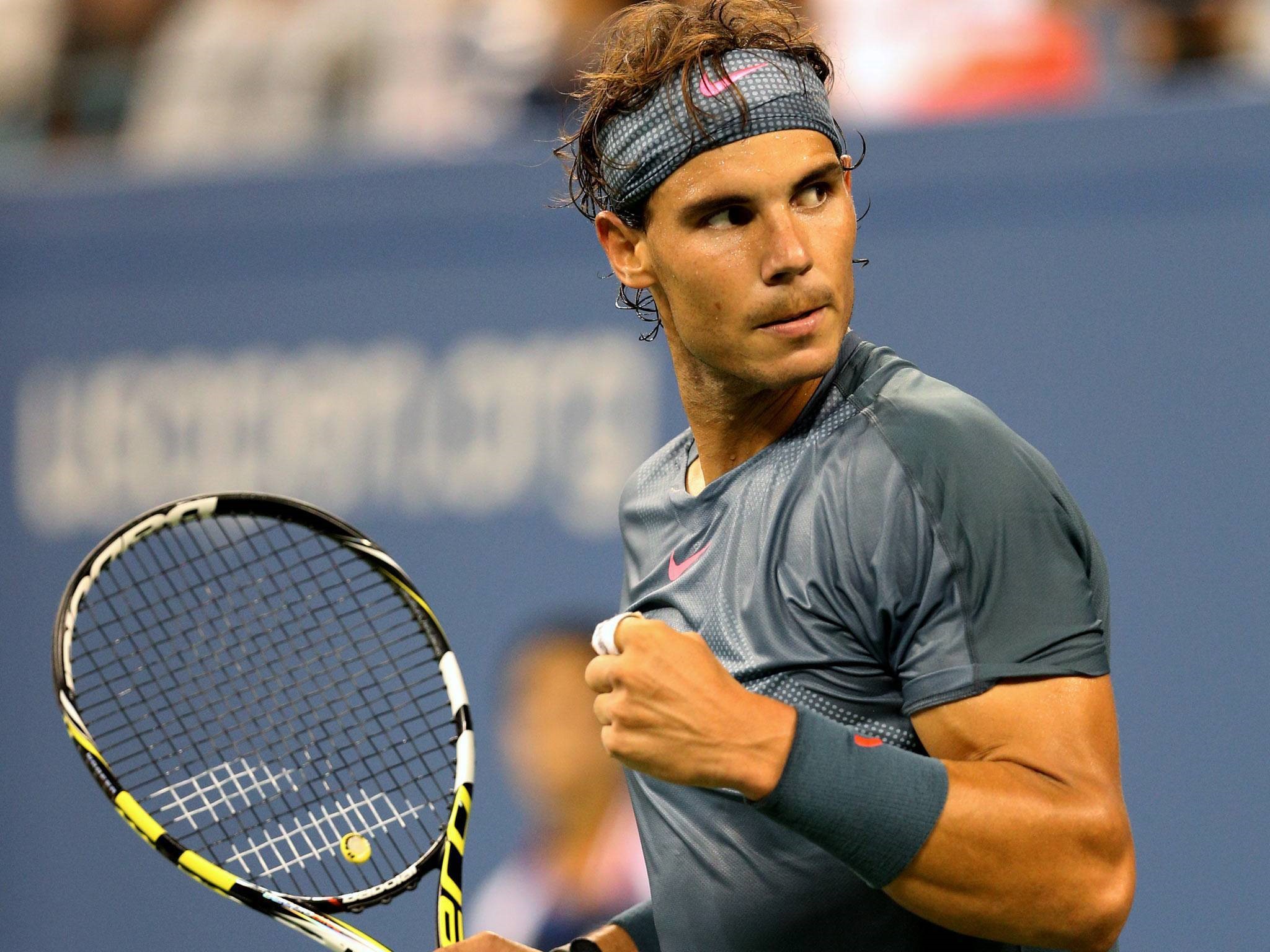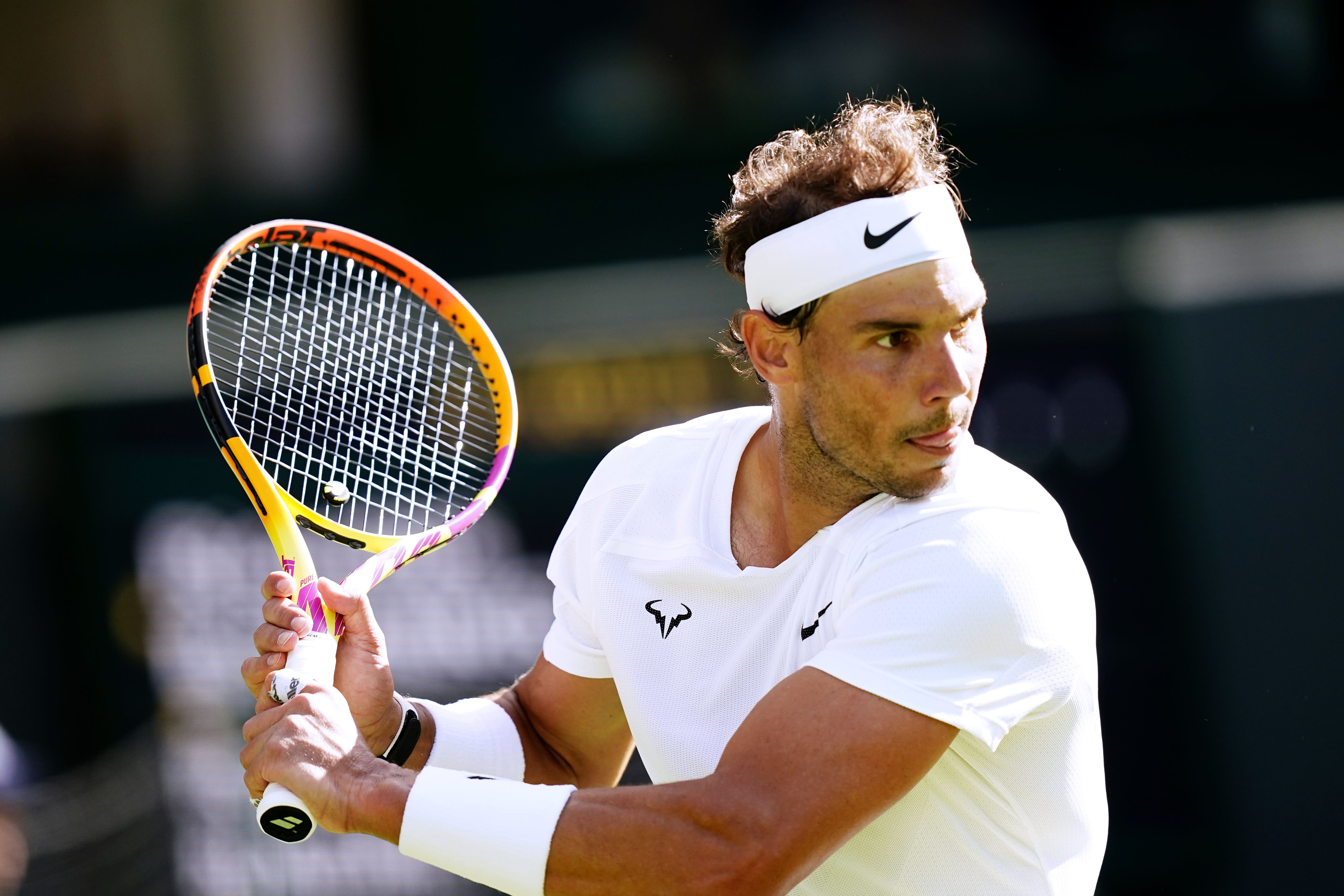Rafael Nadal - A Tennis Icon's Story
Humanized Version
When you think about tennis, it's pretty hard not to think about Rafael Nadal. This incredible athlete, a Spanish tennis player, has truly left a mark that feels permanent in the history books of the sport. His nickname, "the King of Clay," is something that just about everyone knows, and it really speaks to his unbelievable dominance on those red courts. He has built a legacy that will, you know, continue to inspire people for a very long time, showing what sheer determination and a whole lot of talent can achieve in the world of professional sports.
His playing style, with that powerful forehand and an almost unshakeable spirit, often made watching him play feel like witnessing something truly special. For years, fans all over the globe have gathered around their screens, or in the stands, to watch him perform, and honestly, the excitement was always palpable. It's almost as if he was born to play on clay, given how many times he came out on top at the French Open, a feat that, as a matter of fact, seems nearly impossible for anyone else to match.
Now, with his professional playing days behind him, we get to look back at a truly glittering career. We can appreciate the many victories, the moments of pure sporting brilliance, and the sheer grit that defined his time on the court. This article will take a closer look at his journey, from his beginnings in Mallorca to becoming a global sports sensation, and even, you know, receiving a noble title from the Spanish King. It's a chance to really think about what made him such a remarkable figure.
Table of Contents
- Biography - Rafael Nadal's Roots
- What Makes Rafael Nadal a Legend on Clay?
- Rafael Nadal's Grand Slam Collection - How Many Did He Win?
- A Noble Honor - Rafael Nadal's Title
- Saying Goodbye - Rafael Nadal's Retirement
Biography - Rafael Nadal's Roots
Rafael Nadal Parera, born on June 3, 1986, hails from Manacor, a lovely spot on the island of Mallorca, Spain. From a rather young age, it became clear that he had a special connection with tennis. His early days were spent honing those skills that would later make him a global phenomenon. It's really quite something to think about a young boy from an island town growing up to dominate a sport on the world stage. His journey, you know, from those humble beginnings to becoming a recognized figure around the planet, speaks volumes about his dedication and the support he received.
He wasn't just any player; he was someone who seemed to carry the spirit of his home with him onto every court. The way he played, with such intensity and passion, sort of reflected a deeper connection to his background. It’s fair to say that his upbringing in Mallorca gave him a certain grounded quality, a toughness that served him well throughout his demanding career. You can almost feel that sense of place in his game, that, well, determination to fight for every point, which is, in some respects, a very Spanish trait.
Even as he gained fame and success, Rafael Nadal has always appeared to stay true to his roots, often returning to Mallorca. This connection to his home, to his family, and to the place where it all began, seems to be a very important part of who he is. It's a reminder that even the biggest stars have a foundation, a place that shaped them. He is, by the way, not just a sports figure, but a proud representative of his heritage, which is something many people truly admire about him.
Personal Details and Bio Data
| Full Name | Rafael Nadal Parera |
| Born | June 3, 1986 |
| Birthplace | Manacor, Mallorca, Spain |
| Nationality | Spanish |
| Noble Title | 1st Marquis of Llevant de Mallorca |
| Grand Slam Singles Titles | 22 |
| French Open Titles | 14 (a record) |
| Nickname | King of Clay |
| Status | Former Professional Tennis Player (Retired) |
What Makes Rafael Nadal a Legend on Clay?
When people talk about Rafael Nadal and clay courts, it's like they're talking about two things that were just meant to be together. His performances on that particular surface are, frankly, beyond belief. He has this way of moving on clay, a sort of sliding and recovering that makes him seem almost like he's floating, yet he's always in control. It's not just about hitting the ball hard; it's about the spin he puts on it, the angles he creates, and his ability to keep the ball in play for what feels like an eternity. Opponents, honestly, often found themselves worn down, both physically and mentally, trying to keep up with his relentless play.
His famous forehand, packed with a lot of topspin, bounces really high on clay, making it incredibly difficult for anyone to return effectively. This particular shot, combined with his incredible defensive skills, means he can turn what looks like a losing point into a winning one. He just doesn't give up, you know? That fighting spirit is a huge part of his reputation. He's known for chasing down every single ball, no matter how far out of reach it seems, which, in some respects, is very inspiring to watch.
The mental toughness he displays on clay is also a big part of his success. He appears to thrive under pressure, especially in those really important moments. While other players might get a bit nervous, Nadal seems to get stronger, finding another gear. This combination of physical ability, unique technique, and a mind that just won't quit is what, well, really sets him apart on the red dirt. It's why he earned that "King of Clay" nickname, and why it fits him so perfectly. He really made that surface his own, and that's pretty amazing to think about.
Rafael Nadal's Grand Slam Collection - How Many Did He Win?
Rafael Nadal's collection of Grand Slam singles titles is, to be honest, one for the record books. He has amassed a staggering 22 of these major wins throughout his career, which puts him right up there with the very best to ever pick up a racket. Each of these victories represents a huge amount of hard work, dedication, and overcoming some seriously tough opponents. When you consider the sheer number of matches he had to win, the pressure he faced, and the different surfaces he had to adapt to, it's a truly remarkable achievement. He just kept adding to that tally, year after year, which is, you know, a testament to his enduring skill.
Winning a Grand Slam is something every tennis player dreams of, but winning 22 of them is, well, something else entirely. It shows a level of consistency and excellence that very few athletes in any sport manage to achieve. These tournaments are the pinnacle of the sport, drawing the top players from around the world, all vying for that one trophy. For Nadal to have claimed so many of them, it really speaks to his unique talent and his incredible ability to perform when it mattered most. He always seemed to find a way, even when things looked bleak, which is a trait that fans absolutely loved about him.
His total of 22 Grand Slam singles titles places him among the very elite in men's tennis history. This number isn't just a statistic; it represents years of commitment, countless hours of practice, and a profound love for the game. It’s a legacy that will be talked about for generations, a benchmark for future players to aspire to. And, you know, every one of those titles tells a story of perseverance and triumph, making his career truly legendary in every sense of the word. He really did achieve something special with that collection.
The French Open and Rafael Nadal's Reign
If there's one tournament that Rafael Nadal made his own, it's the French Open. His record there is simply unbelievable, unlike anything seen before in tennis. He has won the French Open a record 14 times, which is, honestly, a number that sounds almost made up. To win any major tournament once is a huge deal, but to win the same one 14 times, over such a long period, is just mind-boggling. It truly cemented his status as the "King of Clay," as he consistently outplayed everyone else on those specific courts in Paris.
Every year, it seemed like the question wasn't "Will Nadal win?" but "Who can possibly stop Nadal?" And, more often than not, the answer was "No one." His dominance at Roland Garros is a story in itself, a tale of consistent excellence and an almost mystical connection to the red clay. He seemed to play with an extra gear there, finding shots and angles that nobody else could. It's almost as if the very air of the place energized him, allowing him to perform at a level that was just, well, out of reach for his competitors.
The sheer number of French Open titles he holds is a record that might stand for a very, very long time. It speaks to his specific skill set for clay, his physical toughness, and his unwavering mental strength. Each of those 14 victories is a chapter in a remarkable sporting saga, showcasing his ability to adapt, to fight, and to conquer. It’s a part of his career that, in fact, truly sets him apart and makes him an unforgettable figure in the history of tennis. His reign there was, quite simply, legendary.
A Noble Honor - Rafael Nadal's Title
Beyond his amazing achievements on the tennis court, Rafael Nadal has also received a very special honor from his home country. On June 19, 2025, Spain's King Felipe VI gave him the noble title of the Marqués de Llevant de Mallorca. This is, you know, a pretty big deal, something that goes beyond sports. It shows that his contributions to Spain are recognized not just in terms of athletic prowess, but also for the positive image and inspiration he has given to the nation. It's a way for the country to say "thank you" for everything he has done.
Being named a Marquis is a significant recognition, a sign of high esteem from the royal family and the country itself. It's not something that happens every day, and it highlights the immense respect he has earned, not just as a tennis player, but as a person. The royal family, it seems, truly celebrated his tennis triumphs and the lasting legacy he has built. This honor sort of solidifies his place not just in sports history, but in the broader cultural fabric of Spain, which is, honestly, quite a unique achievement for an athlete.
This noble title is also rather unique because Rafael Nadal is the first man to hold the title of Marqués de Llevant de Mallorca. And, as a hereditary title, it will pass to his son, Rafael, which means his family name will carry this distinction forward. It’s a way of honoring his accomplishments and ensuring that his impact is remembered for generations. This gesture from the King truly acknowledges Nadal's contributions to the nation, showing how much he means to his country. It's a very special kind of recognition, truly.
What Does the Marqués de Llevant de Mallorca Mean for Rafael Nadal?
Receiving the title of Marqués de Llevant de Mallorca is, in a way, more than just a fancy name for Rafael Nadal; it's a profound symbol of appreciation from his country. This honor means that Spain, particularly its royal family, sees him not just as a great athlete, but as someone who has brought immense pride and positive attention to the nation. It’s a public acknowledgment of his status as a national hero, someone whose actions have had a significant impact beyond the boundaries of the tennis court. It's, you know, a very personal form of thanks.
The title connects him even more deeply to his home, Mallorca, as "Llevant de Mallorca" refers to a region on the island. This link makes the honor feel even more personal and fitting, tying his extraordinary global success back to his roots. It suggests that his achievements are seen as a source of national identity and pride, something that unites people across Spain. For Nadal, it probably feels like a very touching tribute to his life's work and his connection to the place he calls home. It’s a very meaningful kind of recognition, to be honest.
Furthermore, the hereditary aspect of the title, meaning it will pass to his son, ensures that the legacy of his contributions will endure through his family line. This adds a truly special layer to the honor, making it a lasting part of his family's history. It’s a way for the country to ensure that Rafael Nadal's impact is remembered and celebrated for generations to come. It’s a permanent mark of respect, showing how much he means to the people of Spain. This title, you know, really solidifies his place in the nation's story.
Saying Goodbye - Rafael Nadal's Retirement
The news of Rafael Nadal stepping away from professional tennis was, for many fans, a rather emotional moment. After a career that spanned decades and brought so much excitement, he officially announced his upcoming retirement. This decision, though anticipated by some given the physical demands of his sport, still brought a wave of feelings for those who had watched him compete for so long. It marked the end of an era, truly, for tennis. He had been a constant presence, a true force, and now, well, that chapter is closing.
His final farewells on the court were, as you might expect, filled with emotion. There were moments of tears, not just from him, but from fans who had followed his every move. He said goodbye to professional tennis, a sport he had given so much to, and which had given him so much in return. It’s a big step for any athlete to leave behind something they have dedicated their entire adult life to, and for someone like Nadal, who played with such intensity, it must have been a particularly significant moment. It's, you know, a bittersweet kind of ending.
Even though he has retired, Rafael Nadal remains one of the most successful men's tennis players in history. His achievements, particularly those 22 Grand Slam singles titles and that amazing record of 14 French Open crowns, ensure his place among the all-time greats. The impact he had on the sport, the way he inspired countless individuals, and the sheer joy he brought to millions of viewers will continue to be felt for a very long time. He is, simply put, a legend whose presence will be missed on the courts, but whose legacy will definitely live on.
Why Did Rafael Nadal Step Away From the Court?
For an athlete like Rafael Nadal, who has pushed his body to its absolute limits for so many years, the decision to step away from the game is often a very personal one, usually connected to physical well-being. The rigorous demands of professional tennis, the constant travel, and the intense training and matches, really take a toll on the body. While the exact reasons for his retirement are personal, it's pretty clear that years of competing at the highest level, with all the injuries and recoveries that come with it, played a significant part in his choice. It's just a very physically demanding sport, you know?
He had, in fact, been dealing with various physical challenges over recent years, which is something that happens to many athletes as they get older. Playing with constant discomfort or pain can make it incredibly difficult to perform at the level required to win Grand Slams. For someone who always gave his absolute best, it might have become clear that his body could no longer sustain the kind of effort needed to compete with the younger generation or even just to feel good on the court. It’s a tough reality for any athlete, honestly.
In his own words, after saying goodbye, he mentioned that he didn't miss it, and then, rather touchingly, he immediately corrected himself, saying, "In fact, I miss it." This brief moment, that little correction, really shows the complex feelings that come with leaving something you love so deeply. It's a mix of relief from the physical grind, but also a longing for the competition, the roar of the crowd, and the feeling of playing at the very top. So, while the physical toll was undoubtedly a major factor, the emotional connection to the sport also plays a huge part in these decisions. It's a very human experience, in a way.
This article has taken a look at the incredible journey of Rafael Nadal, from his early days in Mallorca to becoming one of tennis's most celebrated figures. We've explored his unmatched dominance on clay courts, particularly his record-breaking wins at the French Open, and examined his impressive collection of 22 Grand Slam titles. We also touched upon the special noble title bestowed upon him by King Felipe VI, recognizing his significant contributions to Spain. Finally, we considered his recent retirement from the sport, understanding the physical and emotional aspects of stepping away from such a demanding career. Rafael Nadal's legacy as a true sporting icon, known for his relentless spirit and profound impact, will undoubtedly continue to inspire for many years to come.

Rafael Nadal Pink

Rafael Nadal Pics - Wallpics.Net - Wallpapers, Photos, Pictures

Rafael Nadal remains doubtful for French Open after withdrawing from